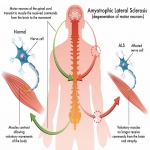What is ALS?

Amyotrophic lateral sclerosis (ALS) is a progressive neurodegenerative disease that affect the nerve cells in the brain and spinal cord. The two types of ALS are sporadic and familial. Sporadic is the most common form and may affect anyone. Familial ALS means the disease is inherited due to a gene mutation.
What is ALS Caused By?
The degeneration of the motor neurons can lead to their termination and this cuts off the brain’s ability to initiate and control muscle movement. This decreases one’s ability to voluntarily move, speak, eat, or breathe.
Signs and Symptoms of ALS

Initial onset and presentation of ALS can vary, but it involves a gradual onset. It could start out with something as simple as in inability to hold their coffee or to pick up a book. Symptoms can begin in the muscles controlling speech and swallowing or in the muscles of the appendages. ALS does not present the same for everyone, but what is universal is the progressive muscle weakness and paralysis. The onset of symptoms is generally painless, but muscle weakness is the most common first symptom. Other early symptoms include tripping, dropping items, abnormal fatigue, slurred speech, and muscle cramping and twisting.
Diagnosis and Treatment of ALS

ALS is challenging to diagnose as there is not one test to determine the diagnosis. Clinical examinations and diagnostic tests are done to rule out other diseases that may mask themselves as ALS. A complete diagnostic testing process would include electromyography (EMG), nerve conduction velocity (NCV), blood and urine testing, spinal tap, X-rays and MRI’s, myelogram of the cervical spine, muscle and maybe nerve biopsy, and a thorough neurological examination.
There are no treatments that can reverse the nerve damage, but there are some to slow the progression of symptoms, prevent complications, and make those affected more comfortable. Two drugs in particular have been permitted to treat ALS, Riluzole (Rilutek) and Edaravone (Radicava). Riluzole is an oral medication shown to increase life expectancy, but can cause dizziness, gastrointestinal conditions and cause changes in liver function. Edaravone is given intravenously and is shown to reduce decline in daily functioning, but it can cause bruising, headaches, and shortness of breath. Additional therapies include breathing care, physical/occupational/speech therapy, nutritional assistants, and psychological and social support.
Resources:
http://www.alsa.org/about-als/
Related Physicians
The providers at Kansas City Bone and Joint Clinic each have their own areas of specialty. Click on the providers below to read more about them.


